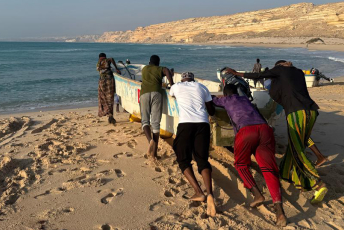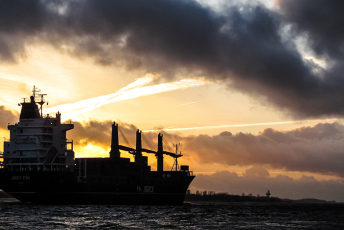The world’s largest crime scene is not part of any specific country, region or territory. Rather, it is the area referred to as the ‘high seas’ – those parts of the planet’s seas and oceans that fall outside of the national jurisdiction of coastal states. This is because governance and regulation are limited in this area, given the principle of the freedom of the seas.
As a result, fragile habitats have been damaged by deep-sea bottom trawling (fishing vessels that scrape the ocean floor) and unique marine biodiversity has been destroyed. In addition, species have been severely overfished. This includes tuna stocks, as recently described in a study on ‘the economics of fishing the high seas’. Many of these crimes and activities have been attributed to transnational organised criminal groups operating at sea, but it could also refer to legal users of the sea carrying out illicit activities. In 2012 , the United Nations (UN) General Assembly noted the existence of ‘possible connections between transnational organised crime (TOC) and fisheries in certain regions of the world’.
A UN Office on Drug and Crime (UNODC) study on TOC in the fisheries sector had previously identified illegal fishing and overfishing, the dumping of toxic waste and pollution from vessels as common criminal activities carried out by transnational networks on the high seas. These are sometimes also referred to as transnational fisheries crime, or transnational environmental crime.
In September 2018, the UN launched formal discussions for a treaty on the conservation of marine biodiversity on the high seas. The talks have been hailed as a welcome development; and not just for conservationists. This historic and long-overdue process, which comes after more than a decade of debate, is envisaged to take two years of negotiation before it is expected to culminate in the adoption of a treaty in 2020. Already dubbed the ‘Paris Agreement for the ocean’, it would be the first-ever international legally binding instrument to protect marine life in international waters.
The treaty will cover two marine areas, namely the ‘high seas’ and another termed ‘The Area’ – as defined by the UN Convention on the Law of the Sea (UNCLOS). The high seas represent ‘all parts of the sea that are not included in the exclusive economic zone, in the territorial sea or in the internal waters of a State, or in the archipelagic waters of an archipelagic State’. The ‘Area’ refers to ‘the seabed and ocean floor and subsoil thereof, beyond the limits of national jurisdiction’.
Up until now, under UNCLOS, ‘all States, whether coastal or land-locked, [have] freedom of navigation, overflight, freedom to lay submarine cables and pipelines, to construct artificial islands and other installations permitted under international law, freedom of fishing, and freedom of scientific research’. The resources within ‘The Area’ are viewed as the common heritage of mankind. The exploration and exploitation of these resources are based on a first-come-first-served principle.
This has been a grey area in international law, notably leaving the high seas open to criminals. Of particular relevance to the new treaty are those forms of TOC committed at sea that have been identified by the UNODC. These include vessel-source pollution, such as the illegal and deliberate discharge of oil into the ocean, and fisheries crimes. The latter often overlap with other forms of TOC, such as drug smuggling and human trafficking. Up to now, legal loopholes have prevented the prosecution of authors of these crimes. The new high seas treaty presents an opportunity to remedy that.
The launch of negotiations in September 2018 by the Intergovernmental Conference was the result of UN General Assembly Resolution 69/292 (2015) and its recommendations; as well as Resolution 72/249 (2017). The future treaty will not replace or supersede the UNCLOS or other relevant instruments. For example, the 1992 Convention on Biodiversity includes a definition of ecological or significant marine areas; and the Food and Agricultural Organisation has developed guidelines for the management of deep-sea fisheries in the high seas. The treaty will be called ‘the United Nations Convention on the Law of the Sea’ on the conservation and sustainable use of marine biological diversity of areas beyond national jurisdiction.
For the African Union’s 55 member countries, which include 38 coastal states, better high seas regulations also means better governance of coastal states. Renowned marine biologist and professor at the University of British Columbia, Daniel Pauly, advocates for a total ban on fishing in the high seas, saying that ‘all the species that are taken from the high seas – like tuna – could still be caught in nationally controlled coastal waters’.
The treaty will indeed ensure that all states, including landlocked nations, participate more equally in the global maritime economy. The African continent therefore stands to benefit significantly from the treaty; perhaps more so than any other region. African countries are jointly participating in the treaty negotiations process under the banner of the G77 and China. How they negotiate the inclusion of the continent’s priorities will be key.
Prior to the first conference in September 2018, where the group was represented by Egypt as rotating president, matters of relevance to African countries were identified during the sessions of the preparatory committee established under Resolution 69/292 (2015). Most of these were retained as part of the focus topics for the two-year cycle of conferences, which is intended to lead to the adoption of the treaty. They include genetic resources, environmental impact assessments, capacity-building and the transfer of marine technology.
Better regulation of the high seas is expected to stem the uncontrolled exploration and exploitation of the seabed. For African states, this means participating in and benefiting from the international maritime economy. There are still two conferences – one in 2019 and one in 2020 – to achieve this. Turning these benefits into a reality, however, calls for a proactive role in negotiations, and African states will have to articulate their positions and priorities with clarity.
Agnes Ebo’o, ENACT Regional Organised Crime Observatory coordinator – Central Africa, ISS







